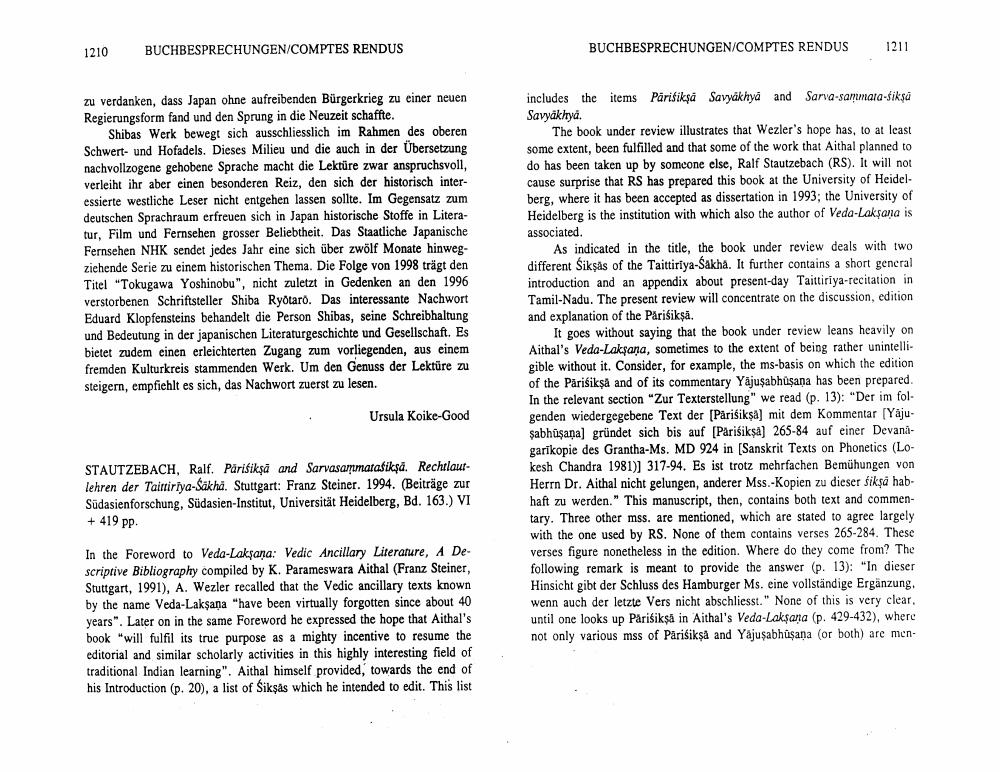Book Title: Buchbesprechungen Comptes Rendus Author(s): Johannes Bronkhorst Publisher: Johannes Bronkhorst View full book textPage 1
________________ 1210 BUCHBESPRECHUNGEN/COMPTES RENDUS BUCHBESPRECHUNGEN/COMPTES RENDUS 1211 zu verdanken, dass Japan ohne aufreibenden Bürgerkrieg zu einer neuen Regierungsform fand und den Sprung in die Neuzeit schaffte. Shibas Werk bewegt sich ausschliesslich im Rahmen des oberen Schwert- und Hofadels. Dieses Milieu und die auch in der Ubersetzung nachvollzogene gehobene Sprache macht die Lektüre zwar anspruchsvoll, verleiht ihr aber einen besonderen Reiz, den sich der historisch interessierte westliche Leser nicht entgehen lassen sollte. Im Gegensatz zum deutschen Sprachraum erfreuen sich in Japan historische Stoffe in Literatur, Film und Fernsehen grosser Beliebtheit. Das Staatliche Japanische Fernsehen NHK sendet jedes Jahr eine sich über zwölf Monate hinwegziehende Serie zu einem historischen Thema. Die Folge von 1998 trägt den Titel "Tokugawa Yoshinobu", nicht zuletzt in Gedenken an den 1996 verstorbenen Schriftsteller Shiba Ryotaro. Das interessante Nachwort Eduard Klopfensteins behandelt die Person Shibas, seine Schreibhaltung und Bedeutung in der japanischen Literaturgeschichte und Gesellschaft. Es bietet zudem einen erleichterten Zugang zum vorliegenden, aus einem fremden Kulturkreis stammenden Werk. Um den Genuss der Lektüre zu steigern, empfiehlt es sich, das Nachwort zuerst zu lesen. includes the items Parifiksa Savyakhya and Sarva sammata-siksa Savyakhya. The book under review illustrates that Wezler's hope has, to at least some extent, been fulfilled and that some of the work that Aithal planned to do has been taken up by someone else, Ralf Stautzebach (RS). It will not cause surprise that RS has prepared this book at the University of Heidelberg, where it has been accepted as dissertation in 1993; the University of Heidelberg is the institution with which also the author of Veda-Laksana is associated As indicated in the title, the book under review deals with two different Siksäs of the Taittiriya-Sakha. It further contains a short general introduction and an appendix about present-day Taittiriya-recitation in Tamil Nadu. The present review will concentrate on the discussion, edition and explanation of the Parisikşa. It goes without saying that the book under review leans heavily on Aithal's Veda-Laksana, sometimes to the extent of being rather unintelligible without it. Consider, for example, the ms-basis on which the edition of the Parisikşå and of its commentary Yajuşabhuşana has been prepared. In the relevant section "Zur Texterstellung" we read (p. 13): "Der im fol. genden wiedergegebene Text der (Parisikşa) mit dem Kommentar (Yaju. sabhūsana) gründet sich bis auf [Pariśikṣa) 265-84 auf einer Devanagarikopie des Grantha-Ms. MD 924 in (Sanskrit Texts on Phonetics (Lokesh Chandra 1981)] 317-94. Es ist trotz mehrfachen Bemühungen von Herrn Dr. Aithal nicht gelungen, anderer Mss.-Kopien zu dieser Sikşá habhaft zu werden." This manuscript, then, contains both text and commentary. Three other mss. are mentioned, which are stated to agree largely with the one used by RS. None of them contains verses 265-284. These verses figure nonetheless in the edition. Where do they come from? The following remark is meant to provide the answer (p. 13): "In dieser Hinsicht gibt der Schluss des Hamburger Ms. eine vollständige Ergänzung, wenn auch der letzte Vers nicht abschliesst." None of this is very clear. until one looks up Parisikså in Aithal's Veda-Laksana (p. 429-432), where not only various mss of Parisikşå and Yajusabhasana (or both) are men. Ursula Koike-Good STAUTZEBACH, Ralf. Parifikşā and Sarvasarrumarafiksa. Rechtlautlehren der Taittiriya-Sakha. Stuttgart: Franz Steiner. 1994. (Beiträge zur Südasienforschung, Südasien-Institut, Universität Heidelberg, Bd. 163.) VI + 419 pp. In the Foreword to Veda-Laksana: Vedic Ancillary Literature, 4 Descriptive Bibliography compiled by K. Parameswara Aithal (Franz Steiner, Stuttgart, 1991), A. Wezler recalled that the Vedic ancillary texts known by the name Veda-Laksana "have been virtually forgotten since about 40 years". Later on in the same Foreword he expressed the hope that Aithal's book "will fulfil its true purpose as a mighty incentive to resume the editorial and similar scholarly activities in this highly interesting field of traditional Indian learning". Aithal himself provided towards the end of his Introduction (p. 20), a list of Sikşas which he intended to edit. This listPage Navigation
1 2 3 4 5 6 7 8
